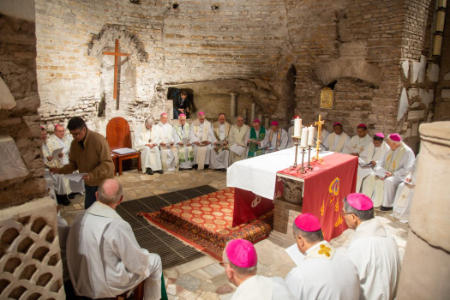- Articles
- SSpSAP
- Holy Spirit Adoration Sisters
- 2020
- Comments: No Comments
Subject: The Pacto of the Catacombs
Language: English, Spanish
Publisher: Witnessing to the Word / In Dialogue


The history of the Catacombs in Rome demonstrates how the first generations of Christians, as a marginalized and oppressed group of their time, had to find places outside the city to bury their dead; among them were many of their martyrs. The closeness to the martyrs helped the Christians in nourishing their faith, being faithful in time of persecutions and growing in their commitment to follow the Lord. The catacombs therefore became a witness of the humble and poor stage of the Church, of the Church of the simple and marginalized people, a Church that knows suffering, a poor Church that serves the poor.
The call back to the spirit of the Catacombs can be the way for the Church to remain faithful to its Master and to the Gospel. In his homily during the Mass at the catacombs of Domitilla on September 12, 1965, before reconvening for the last section of the Second Vatican Council, Pope Paul VI said, “The Lord gives us a lesson of simplicity in our wanting and tasting, the doctrine of poverty in the moral and religious sense of this weighty and serious evangelical word. This doctrine finds its school, its Chair, its affirmation here in the catacombs”.
Around two months after the historic visit of Paul VI to the Domitilla Catacombs, on the 16th of November 1965, forty bishops from all over the world, celebrated the Eucharist and signed a document that expressed their personal commitments as bishops to the ideals of the Council. It was given the suggestive title of the Pact of the Catacombs. The complete text is transcribed in the Chronicles of Vatican II by the Franciscan bishop Boaventura Kloppenburg. He titled the document: Pact of the Servant and Poor Church.

In thirteen points the bishops committed themselves to a simple life, to live according to “the ordinary manner of their people in all that concerns housing, food, means of transport, and related matters”, to renounce privileges, titles and symbols of power and distance, to entrust the administration of the temporal goods of their dioceses to competent lay people. Although in the last paragraph of the Pact the bishops committed themselves to bring their resolution to the attention of their clergy and faithful in their dioceses, the fact is that the Pact has not been widely propagated. Though it was not hidden, it was forgotten. As a document the Pact is forgotten, but as a source of inspiration it has always been alive, at least for some of the signing bishops. Bishops like Helder Camara, Luigi Betazzi, and Enrico Angelleli Carletti took concrete steps to bring the Church closer to the world of the poor and marginalized. They did not talk much about the document they signed, but manifested its content in the way they lived and served.
In January 2009 we officially started our mission at the Catacombs. However, it was only in the last years we gradually came to know something about the Pact as information collected from confreres and employees came to the fore. Some notable material was provided by the Brazilian theologian José Oscar Beozzo. We decided to use the 50th anniversary of the Pact of the Catacombs as a platform to promote the Pact and unveil its content as a source of inspiration for the life and mission of the Church today. In the first volume of In Word and Deed 2013, for the first time, we brought to the attention of the whole Society the Pact of the Catacombs, presenting it as one of the four examples which carry the spirit of the Second Vatican Council. Since then a series of activities have been planned and are taking place. Why do we give so much attention to the Pact of Catacombs by organizing so many activities? We want to help people who come to the Catacombs to get in touch with the testimony of the first generations of Christians and be inspired to give witness to their faith as Christians today. Now, with the Pact of the Catacombs we find another source of inspiration to truly live as Christians. This same inspiration belongs to the whole Church and needs to be made known to all Christians.
What was signed as a resolution of the bishops five decades ago is still valid for all the followers of Jesus who are called to be in solidarity with the poor and marginalized. The simplicity of life and the transparency of structures underlined by the bishops are still ways to be credible for all those who are involved in the evangelizing task of the Church today. In the midst of the challenges the worldwide society is facing today with regards to refugees and migrants, the conflicts between religions and ethnic groups, the increasing unemployment among the young generation, corruption perpetuated by the politically powerful and exploitation of nature, it is imperative that the task of evangelization takes the way of solidarity, sharing resources with the needy and defending the rights of the weak.
A poor Church serving the poor, however idealistic and utopian it might sound, remains the genuine call of the gospel to all of us. This call is not reserved to the signing bishops. Also, within our own Society we have confreres taking initiatives to be close to the poor, sharing their lives with those at the margins. Our confreres are working in remote places, lacking many comforts, and oftentimes not wanted by others, providing educational facilities, empowering people by building up cooperatives, etc. In the urban contexts our confreres open their hearts and houses to help the migrants and refugees or to accompany people with HIV/AIDS. In recent years the issue of environment related to the mining industries and the fight against human trafficking became major concerns of many people we serve and therefore caught the attention of the members of our Society to act upon these issues.
To further renew our missionary commitment in light of the Pact of the Catacombs, we want to propose the following three points. Our first proposal is to listen to the prophetic voice of the poor. With their resolutions the bishops did not only underline the importance of their going to the poor and marginalized, but also at the same time the necessity to take seriously the poor as evangelizers. The poor have a mission, a message to share with others. They are not the silent receptors of our proclamation of the good news and objects of our charitable works. Mission is not only the move from the center to the margins, but also from the margins to the center, as stated by the World Council of Churches in 2012. Where are the poor, the last ones, in our life and mission? We reiterate the question we often raise at different occasions: “How can we give the poor the opportunity to be formators for our young confreres?”
Second is to learn that simple external appearances are an expression of the simplicity of the spirit. The bishops promised to adjust their life to how the ordinary people live in terms of housing, food, and means of transport. They were also willing to renounce symbols and titles that anchor privileges and superiority. How important these external aspects are, but they can only serve the evangelizing task of the Church if they come from simplicity of the heart and spirit. Many of us are from, or working in, cultures that highly appreciate religious and even more so priests. However, in a mission that serves God’s people we need to be aware not to misuse the appreciation of the people for our own benefits, enjoying the position to the point of excusing ourselves from being responsible and accountable for what we are thinking, saying, and doing.
Third is to accept the need to have the spirit and skills of collaboration. The bishops were very much aware of the urgency and necessity to collaborate with other bishops as well with their clergy, the religious, lay people and all people of good will. Oftentimes we experience collaboration as a hindrance for the efficiency in our work. A one-man decision is much easier to make and to implement. However, such decisions are bound to depend on that one person. Mission is not only about effectiveness in implementing projects but also educating, forming, and empowering others to actively participate. Collaboration, even if it involves much patience, understanding and compromise, enables others to feel part of the whole mission with their responsibility invested in it.

Fifty years ago, the Pact of the Catacombs was drafted. Not only are we as a Society proud of the fact that the place where this historic pact was signed is under our care. We feel blessed that we are instruments to announce to the Church that the spirit of the Pact remains valid for all of us today. As Divine Word Missionaries we continue to embrace our call to put the last first and allow ourselves to be guided by the spirit of the Pact of the Catacombs. Individually and as communities we read and reflect how the Pact continues to be a source of inspiration in our mission.
https://witword.org/en/in-dialogue/136-dialogue-poors/656-renewing-missionary-commitment-with-the-pact-of-the-catacombs
Copyrights © 2020- Vivat Deus Editorial Board - All rights reserved
Welcome!
Sign up to receive new content in your inbox.
The subscription is a multistep process, so please check your email after you submit the form and follow the instructions.
We promise we’ll never spam! Take a look at our Privacy Policy for more info.
¡Bienvenido!
Suscríbase para recibir nuevos contenidos en su bandeja de entrada.
La suscripción es un proceso de varios pasos, así que revise su correo electrónico después de enviar el formulario y siga las instrucciones.
¡Prometemos que nunca haremos spam! Echa un vistazo a nuestra Política de Privacidad para más información.